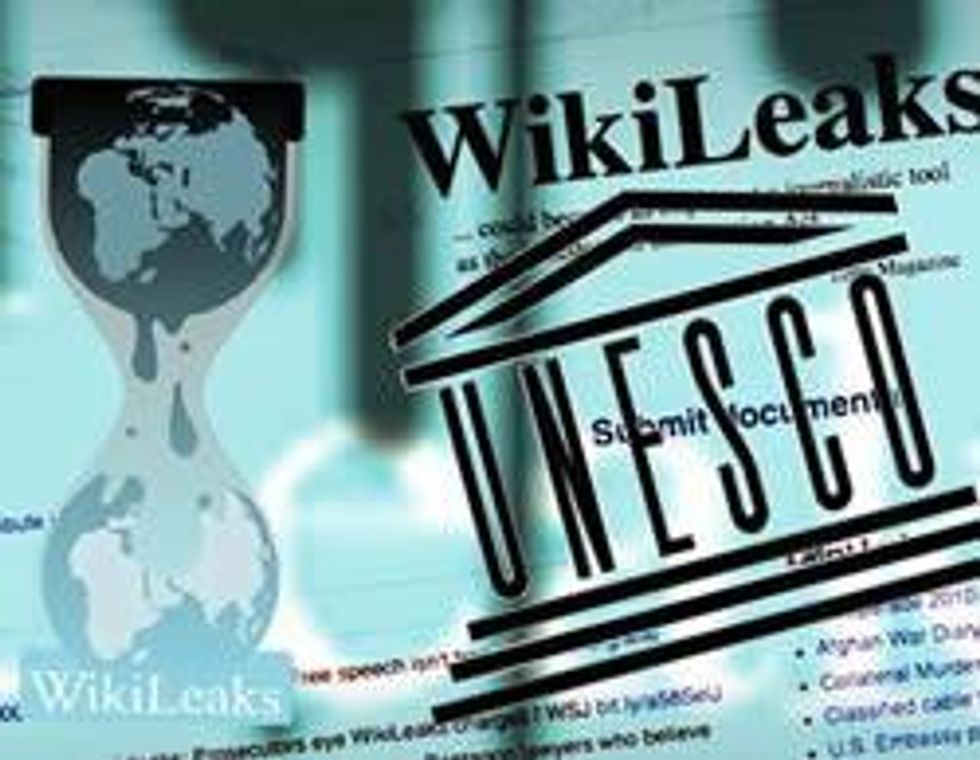WikiLeaks has lodged a strong protest with the UNESCO (United Nations Educational, Scientific and Cultural Organization) for "banning'' it from an international conference it is hosting at its headquarters in Paris on the impact of the whistleblower website's activities.
It said the U.S. organizers of the two-day conference, which opened on Thursday, had "stacked'' it with WikiLeaks' opponents and "blocked all speakers from WikiLeaks, stating that the decision to censor WikiLeaks representation was an exercise in 'freedom of expression... our right to give voice to speakers of our choice''."
* * *
UNESCO describes the 2-day conference on their website:
The conference "The Media World after WikiLeaks and News of the World" aims to gather leading media representatives, professional and "citizen" journalists and media law experts to exchange views on these issues and to discuss good practices in traditional professional journalism and citizen journalism in the digital era.
With a stunning 2 billion persons estimated to be using the Internet and producing 156 million public blogs in 2011, there has been a surge of social networks, user-generated content and micro-blogging that has enabled all Internet users to become public communicators. Along with the spread of the Internet, WikiLeaks' release of a massive number of classified government documents and its initial collaboration with traditional news media has modified the media landscape and raised crucial questions for journalism.
The WikiLeaks episode raised many issues related to freedom of expression, freedom of information, national security, privacy and ethics. The WikiLeaks developments raise basic questions about how journalists do their jobs. The conference aims to explore a wide range of new questions for traditional media and journalism posed by the WikiLeaks phenomenon:
How can journalists deal with the massive explosion of primary source data made available on the Internet?
Should journalists' roles and their professional and ethical standards be reconsidered?
What is the relationship between "citizen journalism" and traditional journalistic professionalism?
What are the challenges for international and domestic law related to privacy, national security, public order and Internet freedom?
What is the future of government-media relations?
* * *
The Hindu (India) is reporting:
[...] Describing it as "an intolerable abuse" of the United Nations organization, WikiLeaks founder Julian Assange demanded an immediate investigation and said it was "time to occupy UNESCO."
Describing it as "an intolerable abuse'' of the United Nations organization, WikiLeaks founder Julian Assange demanded an immediate investigation and said it was "time to occupy UNESCO""UNESCO must conduct a full, frank and open investigation as to how its constitution, which tasks it to promote freedom of expression, freedom of information and freedom of communication, has become a blunt instrument of censorship. UNESCO must demonstrate that cold-war style power-plays, by the United States, or indeed any other country, are no longer acceptable," he said.
Mr. Assange said that UNESCO had "made itself an international human rights joke."
"To use 'freedom of expression' to censor WikiLeaks from a conference about WikiLeaks is an Orwellian absurdity beyond words. This is an intolerable abuse of UNESCO's Constitution. It's time to occupy UNESCO."
In a letter to UNESCO, WikiLeaks spokesperson Kristinn Hrafnsson said: "UNESCO has a duty to assure that fairness and balance is secured in important discussions carried out under the banner of the organization. It is obvious that this will hardly be the case, given the selection of speakers. This is both a disgrace to UNESCO and potentially harmful to WikiLeaks."
In a statement posted on its website, WikiLeaks said the conference was packed with "who's who" of the websites opponents and critics "no matter how insignificant or poorly informed."
"This includes speakers who are not merely critics, but four who have active legal conflicts with the organization.''
It said the board of the US World Press Freedom Committee (WPFC) -- listed by UNESCO as the conference organizers in cooperation with the UNESCO Communication & Information Sector-- comprised "Washington insiders, cold war ideological allies such as Freedom House and the disgraced IAPA and U.S. mainstream media groups''.
Ronald Koven of the WPFC justified WikiLeaks' exclusion saying: "The main focus of this conference is not about WikiLeaks as such but about the implications of its actions for the future of professional journalism."
WikiLeaks said the claim was "at odds'' with the conference aims listed on its website-namely "to explore a wide range of new questions for traditional media and journalism posed by the WikiLeaks phenomenon."
UNESCO reportedly told WikiLeaks that it "did not have intention to cause any polemic" and that WikiLeaks could attend the conference as long as it did not demand to participate as speakers.
This, WikiLeaks argued, was an attempt "to deny WikiLeaks work as journalism." [...]
# # #




